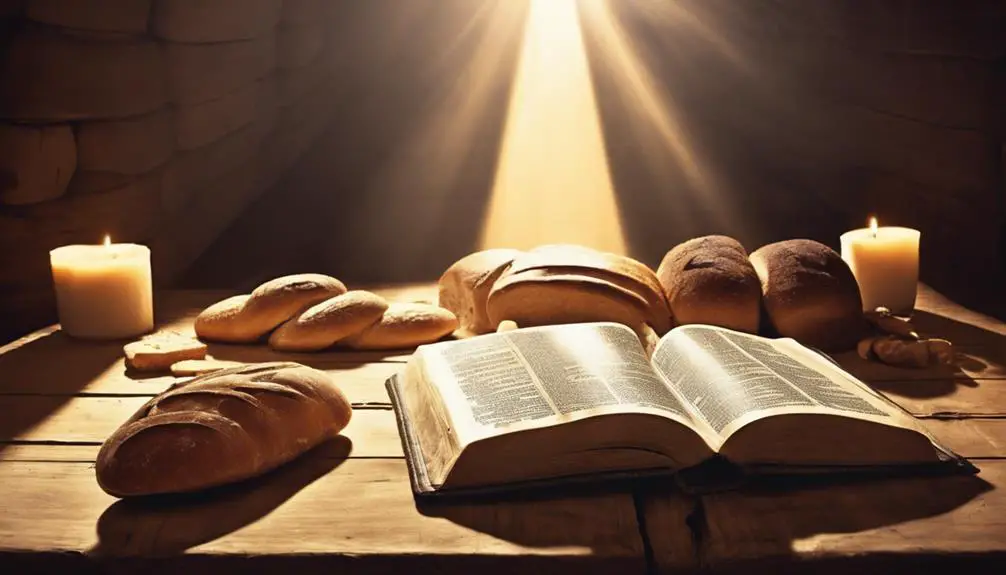Navigate the depths of spiritual hunger in the Bible, uncovering how ancient wisdom satiates modern souls' yearning for fulfillment.

Spiritual Hunger in the Bible
In the Bible, physical sustenance and spiritual hunger sit in stark contrast, a dichotomy that invites you to explore the depths of your own faith.
You'll find the Israelites wandering in the wilderness, their bellies filled yet their spirits yearning for more, and Psalms that echo this longing for God.
As Jesus presents himself as the Bread of Life, the narrative takes a turn, suggesting a fulfillment accessible through faith.
But what does this mean for you? Let's embark on this journey together, uncovering how these ancient texts might satisfy the spiritual hunger gnawing at the modern soul.
Key Takeaways
- Spiritual hunger is depicted through narratives like the Israelites' journey and Psalms, highlighting a deep longing for divine presence.
- Jesus is portrayed as the ultimate source of spiritual nourishment, offering eternal satisfaction and a connection to the divine.
- Prophetic voices, including Elijah and Jeremiah, express humanity's profound spiritual yearnings and the quest for divine guidance.
- Overcoming doubts and engaging in community and personal reflection are essential for growth on one's spiritual journey.
The Israelites' Wilderness Journey

During their wilderness journey, the Israelites experienced a profound spiritual hunger, reflecting a broader narrative of human searching for divine sustenance. This longing wasn't merely for physical nourishment, but a deeper yearning for spiritual fulfillment and understanding. As you delve into their story, you'll find that the manna miracles and wilderness complaints aren't just historical events but are emblematic of a complex relationship between humanity and the divine.
The manna miracles, where bread from heaven was provided daily, serve as a testament to divine provision in times of need. Yet, these miracles also underscore a test of faith and obedience. You're invited to reflect on the nature of this sustenance, which was both a physical provision and a spiritual symbol of reliance on God.
Moreover, the wilderness complaints reveal a human tendency to doubt and question, even in the face of miracles. These moments of discontent and questioning highlight a critical aspect of spiritual hunger — it's not solely about the absence of belief, but often about the struggle to maintain faith amidst hardship and uncertainty. Through these narratives, you're encouraged to ponder on your own spiritual journey and the ways in which divine sustenance manifests in times of need.
Psalms: Longing for God
Reflecting on the Israelites' wilderness journey reveals a profound spiritual hunger, a theme that finds deep resonance in the Psalms through the expressed longing for God. This collection of prayers and hymns embodies a universal quest for divine presence, articulated through personal meditation and communal lament. The Psalms serve as a mirror to the soul's intrinsic yearning for a connection that transcends the physical realm, offering insights into the spiritual dynamics of longing and fulfillment.
In your exploration of the Psalms, you'll encounter a rich tapestry of emotions, from deep despair to exuberant joy, all rooted in the desire for God's closeness. Through personal meditation, the Psalmists articulate a nuanced understanding of spiritual hunger, recognizing the divine presence as the ultimate source of sustenance and satisfaction. This spiritual longing isn't merely an abstract concept but a lived experience, making the Psalms profoundly relatable across generations and cultures.
Analyzing these ancient texts, you'll find that the Psalmists' hunger for God goes beyond mere ritual or tradition. It's a deeply personal quest for meaning, comfort, and guidance in the face of life's trials and tribulations. The Psalms, therefore, offer timeless wisdom on the nature of spiritual hunger and the pursuit of divine presence.
Jesus and the Bread of Life

In the New Testament, Jesus declares Himself the Bread of Life, directly addressing humanity's profound spiritual hunger with a promise of eternal satisfaction. This declaration isn't just a metaphorical statement; it's a profound theological assertion that ties directly into the miracle symbolism and Eucharistic parallels found throughout the Bible.
Here are four key points to consider:
- Miracle Symbolism: The miracles of Jesus, especially the feeding of the 5,000, serve not only as demonstrations of divine power but also as symbolic acts that point to Jesus as the source of spiritual nourishment.
- Eucharistic Parallels: Jesus' identification as the Bread of Life prefigures the Eucharist, where believers partake in the body and blood of Christ. This sacrament is a direct manifestation of Jesus' promise to sustain those who believe in Him.
- Eternal Satisfaction: Unlike physical food, which satisfies temporarily, Jesus offers spiritual nourishment that promises eternal life. This is a profound assurance of spiritual fulfillment and salvation.
- Universal Invitation: Jesus' offer is inclusive, extending an invitation to all who recognize their spiritual hunger and seek sustenance in Him.
Through this lens, Jesus' role as the Bread of Life encourages a deeper reflection on the nature of spiritual fulfillment and the eternal promise that faith in Him offers.
Prophets: Voices of Spiritual Yearning
Moving beyond Jesus as the Bread of Life, the biblical prophets emerge as pivotal figures, articulating the deep spiritual yearnings of humanity. They're not just messengers or foretellers; they embody the profound hunger for divine connection and understanding that resides in every human heart.
Consider Elijah's retreat to the wilderness, a vivid illustration of this spiritual longing. It's in his isolation and desperation that he encounters God, not in the earthquake or the fire, but in the gentle whisper. This narrative isn't just about physical survival; it's a profound meditation on the nature of spiritual sustenance. Elijah's journey reminds you that true fulfillment doesn't come from the clamor of the world but from the quiet, steady voice of the Divine.
Similarly, Jeremiah's lamentations serve as a poignant expression of spiritual yearning amid despair. His cries of sorrow aren't mere expressions of personal pain but articulate a collective yearning for divine presence and guidance in times of profound disconnection and loss. Through Jeremiah, you're invited to reflect on the depths of spiritual longing that can be found in the darkest moments, highlighting the enduring human quest for a deeper, more meaningful connection with the Divine.
Fulfillment Through Faith

Faith acts as a bridge, offering you a path to fulfillment amidst the spiritual wilderness that often pervades human existence. This journey, however, isn't without its challenges. Modern applications of faith illuminate how it can guide you, yet you're also likely to encounter various faith obstacles. Reflecting on these aspects provides a deeper understanding of faith's role in spiritual fulfillment.
Consider the following to navigate your path:
- Embrace Doubt: Acknowledge that doubt isn't the opposite of faith but a part of its process. It prompts critical thinking and deeper exploration of beliefs.
- Community Engagement: Participate in faith communities. They offer support, guidance, and real-world applications of spiritual principles.
- Personal Reflection: Regularly reflect on your beliefs and experiences. This introspection can strengthen your faith and clarify your spiritual goals.
- Overcoming Obstacles: Understand that obstacles to faith, such as disillusionment or skepticism, can serve as opportunities for growth. Engaging with these challenges can deepen your faith.
In essence, faith's journey towards fulfillment is multifaceted, involving both introspection and community. It's about finding balance, embracing challenges, and applying faith's lessons in a modern context.
Frequently Asked Questions
How Does Modern Society Interpret and Address Spiritual Hunger Compared to Biblical Times?
In modern society, you see spiritual hunger addressed through a mix of digital spirituality and secular solutions, diverging from biblical approaches. People often turn to online communities and apps for spiritual fulfillment, reflecting a shift towards digital spirituality.
Secular solutions, like mindfulness and self-help strategies, also play a significant role, indicating a move away from traditional religious practices. This contrast highlights a broader evolution in how society interprets and addresses spiritual needs.
Are There Any Non-Biblical Cultures or Religions That Share Similar Concepts of Spiritual Hunger?
Absolutely, you're diving into an ocean of cultures and religions brimming with the quest for spiritual fulfillment.
Cultural comparisons reveal striking religious parallels across the globe, where spiritual hunger isn't just a whisper but a roar in the hearts of many.
From the ancient practices of Buddhism's deep yearning for enlightenment to Hinduism's pursuit of moksha, these traditions mirror humanity's timeless quest to quench an insatiable thirst for spiritual meaning and connection.
What Role Does Community or Fellowship Play in Satisfying Spiritual Hunger According to the Bible?
You'll find that community and fellowship are central in quenching your spiritual thirst. The Bible emphasizes communal worship and fellowship meals as pivotal practices.
These gatherings aren't just social events; they're deeply spiritual, fostering a sense of belonging and shared faith. Through them, you're reminded that you're part of a larger body, interconnected and reliant on one another, which plays a crucial role in satisfying your spiritual hunger.
How Does the Concept of Spiritual Hunger Relate to Physical Hunger or Poverty in the Bible?
In the tapestry of life, you'll find that spiritual hunger intertwines with physical need. The Bible often marries the idea of Divine Provision to both realms, illustrating that one's physical hunger or poverty mirrors a deeper, spiritual longing.
Through Fasting Traditions, it emphasizes the importance of recognizing and addressing both types of hunger. This connection invites reflection on how material and spiritual fulfillments are deeply interwoven, urging a holistic approach to nourishment.
Can Spiritual Hunger Be Fully Satisfied in One's Lifetime, or Is It an Ongoing Journey According to Biblical Teachings?
You're exploring if you can fully quench your spiritual thirst within your lifetime, or if it's more of an everlasting quest. According to biblical teachings, this pursuit of spiritual fulfillment is indeed a personal journey that doesn't find its conclusion here on earth.
Eternal satisfaction, as described in scripture, suggests that while moments of fulfillment are possible, the complete satiation of our spiritual hunger is part of an ongoing, celestial journey.
Conclusion
In the grand tapestry of spiritual narratives, your soul's journey mirrors the Israelites' desert wanderings, an odyssey craving divine sustenance.
Like a psalmist, you thirst for the Almighty's presence, a parched land awaiting heavenly rain.
Jesus, the Bread of Life, offers an all-you-can-eat buffet of everlasting fulfillment, contrasting sharply with the prophets' fiery appetites for righteousness.
Your faith, then, becomes the ultimate feast, a banquet table stretching beyond the horizon, where every hunger pang is met with a celestial course.



Sign up